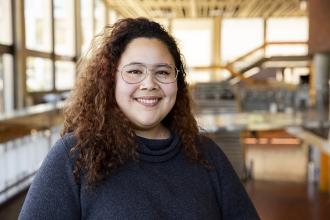“This is the first semester that I really feel like an actor. And like a person within theater. I feel like I was a person who was all talk and no action for a lot of my life when it came to theater, acting, performing. I called myself an actor, I called myself a writer, but I didn’t apply it to my life.
Some people describe acting as the art of lying. People lie on stage — they become someone else, and they pretend for a few moments, and that’s it. But the way that I look at acting is it’s really being at your most truthful and vulnerable.
So, for me, with every character that I play, with every moment that I have on stage, I am giving the audience a little bit of my truth. A little bit of my story. A little bit of me. And so being on stage, it’s terrifying because I’m really vulnerable. But at the same time, it’s a relief to be able to give that much of myself to someone else. And to see someone respond to that. And to hear what they have to say about it. I think that’s what’s the most satisfying about it.
When I was at Los Medanos College in Pittsburg, I wrote a short one-act play called Mis Colores. It’s based on the experiences I had growing up as a Mexican American woman — having that tension between feeling like I need to assimilate and also feeling like I need to be true to both of my identities.
“This is the first semester that I really feel like an actor,” says Beatriz.
This semester, I’m in the main stage Theater, Dance and Performance Studies production House of the Spirits. It’s based on a novel by Isabel Allende. It tells the story of four generations of the Trueba family and traces the post-Colonial social and political upheavals of Chile, a country that is unnamed in the play.
I don’t have a huge role, but I feel like I’ve learned so much being in the show. The entire ensemble cast is on stage for most of the show. I came to realize that I don’t have to be a main character, or even a named character, to inform the process. I am a unique and vital part of the show. We all are.
It can be hard to find a community here that really understands the experiences that people of color are going through, especially people of color within the industry.
So, some of my friends in the theater department and I created an organization called Colors of Theater, where we talk about these things. Let’s talk about how much of a problem color blind casting can be. Let’s talk about our fears of navigating this industry as artists of color.
It’s been eye-opening to realize that there hasn’t been a lot of media that I’ve seen that represents me, that represents my family, that represents my story. And I think coming to that realization has motivated me to be like, ‘Hey, I want to be the one to tell a story that I can relate to and that, hopefully, other people can relate to as well.'”
